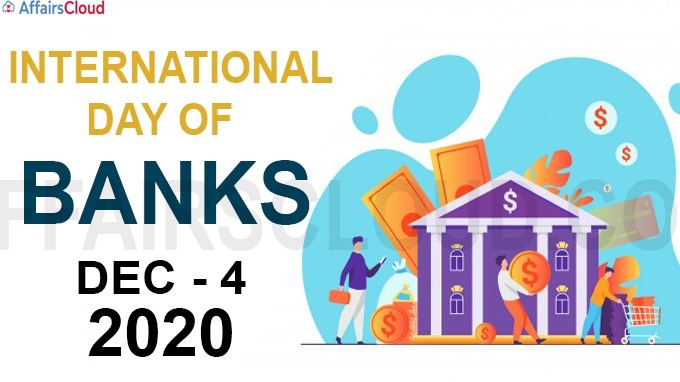 The United Nations (UN)’s celebrates the first ever International Day of Banks across the globe on 4th December 2020. The day is observed to recognise the important potential of multilateral development banks and other international development banks in financing sustainable development.
The United Nations (UN)’s celebrates the first ever International Day of Banks across the globe on 4th December 2020. The day is observed to recognise the important potential of multilateral development banks and other international development banks in financing sustainable development.
This reaffirms the importance of achieving the targets of Sustainable Development Goals(SDG) by 2030.
The day recognises the vital role of the banking systems in the member state of UN contributing to improve its standard of living.
Background:
i.The United Nations General Assembly(UNGA) adopted the resolution A/RES/74/245 on 19th December 2019 and proclaimed December 4th of every year as the International Day of Banks.
ii.The resolution highlights the relevance of inclusion in the international financial system at all levels and the importance of considering financial inclusion as a policy objective in financial regulation, in accordance with national priorities and legislation.
Financing for Sustainable Development:
The 2020 Financing for Sustainable Development Report of the United Nations’ Inter-Agency Task Force on Financing for Development calls for the urgent actions to
- Prevent debt crisis through suspending debt payments from low income countries and Least Developed Countries (LDCs).
- Reestablish financial stability by providing sufficient liquidity for developing markets.
- Prevent the sharp fall in economic activities and support countries which need globally coordinated response.
- Eliminate the trade barriers that affect the supply chain and promote trade and promote inclusive growth.
Risks for Sustainable Development:
i.More than 30 LDCs and vulnerable countries are in high risk of debt distress, hindering their ability to invest in sustainable development goals(SDG).
ii.Numerous countries have faced major capital outflows with aggregate net outflow of more than 200 billion USD from developing countries expected for 2018.
iii.Around 50% of goods worth trillion dollars are under trade restriction which is 7time more than the previous reporting period.
Financial inclusion in India:
The Reserve Bank of India introduced the concept of financial inclusion in India in 2005.
The government of India has introduced various schemes which includes
Pradhan Mantri Jan Dhan Yojana (PMJDY), Jeevan Suraksha Bandhan Yojana, Pradhan Mantri Vaya Vandana Yojana, Pradhan Mantri Mudra Yojana, Atal Pension Yojana (APY) and Sukanya Samriddhi Yojana.
Financial inclusion:
Financial inclusion is a method of providing banking and financial services to individuals.
It is defined as the process of ensuring access to financial products and services required by the vulnerable groups at an affordable cost in a transparent manner by institutional players.
About United Nations General Assembly(UNGA):
President– Volkan Bozkir
Headquarters– New York, United States




